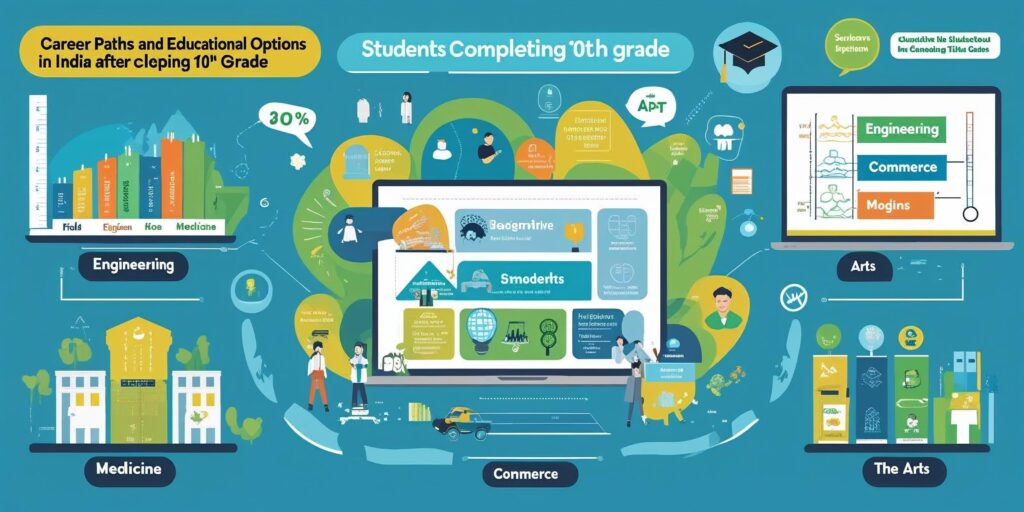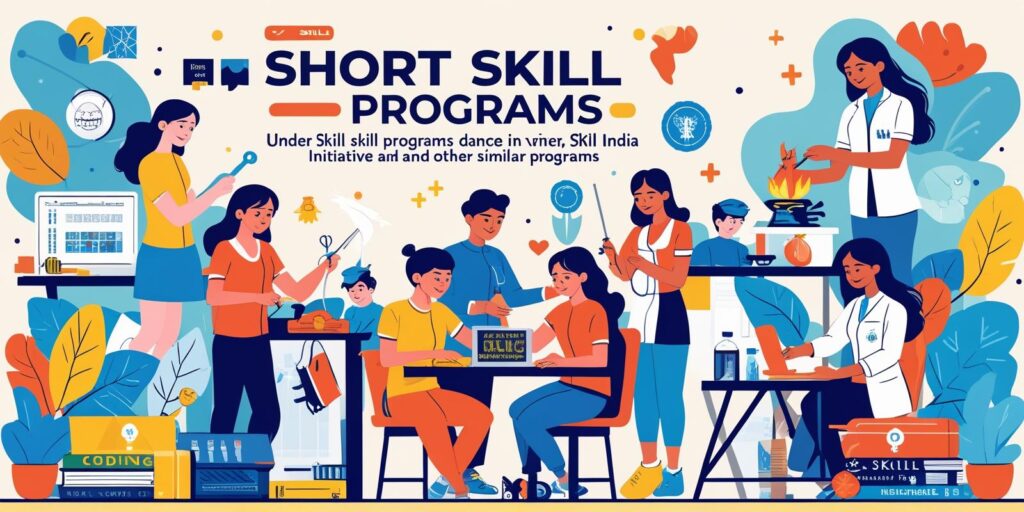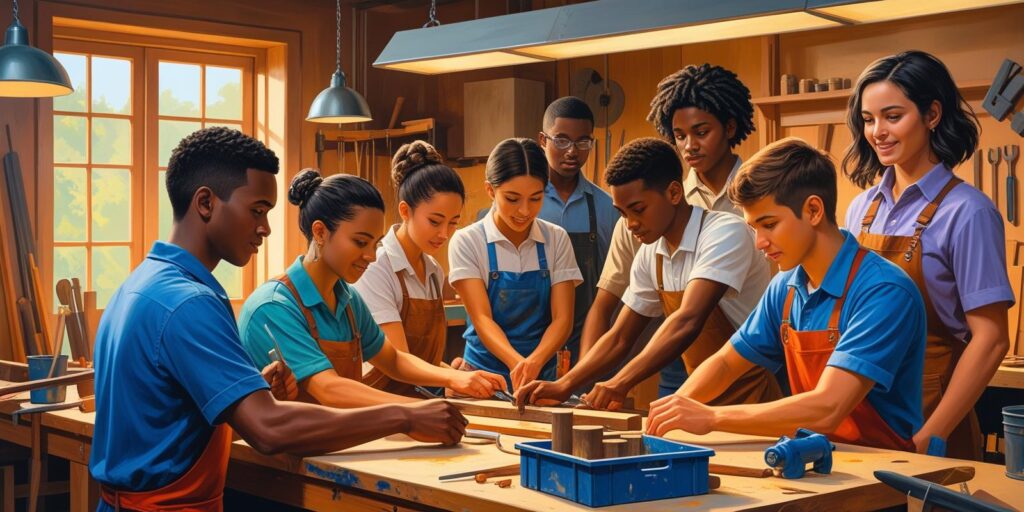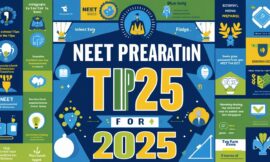Career Guide: What After 10th Grade in India? (2025 Friendly Mega Guide)

Hey champ—Class 10 is done.
Take a deep breath.
Now comes that big, slightly scary question: “What should I do next?”
Science, Commerce, Arts… or maybe a Polytechnic Diploma, ITI, Open Schooling, Skill courses, or even an Apprenticeship?
This guide speaks to you like a friend. No jargon. No pressure.
Just clear choices, practical steps, and simple explanations so you can pick a path that actually fits you.
First things first: your choices at a glance
Academic routes
A) Class 11–12 (Science / Commerce / Arts)
It is best if you want to keep degree options wide open—engineering, medicine, management, law, design, humanities, and more.
B) Open Schooling (NIOS or your state’s open board)
Open Schooling, offered through the National Institute of Open Schooling (NIOS) or various State Open Boards.
It provides you with the opportunity to complete your Class 11–12 education in a flexible manner.
Unlike regular schooling, it allows you for flexible timings, credit transfer options, and better work–study balance.
This system is especially useful for students who cannot attend full-time classes due to personal, financial, or professional reasons.
Open Schooling is fully recognized for higher studies, competitive exams, and employment opportunities.
Skills & job-ready routes
A) Polytechnic Diploma (10 + 3 years)
A Polytechnic Diploma is a three-year technical program. You can pursue immediately after completing Class 10.
It focuses on practical engineering and technology skills, preparing you for industry-oriented roles.
One of the key advantages of this pathway is that many colleges offer lateral entry into the second year of a B.Tech/B.E. program.
What this means for you, after completing the diploma you get a smooth route for higher education.
B) ITI (Industrial Training Institute)
It is Short, hands-on trades (6–24 months) like Electrician, Fitter, COPA (Computer Operator & Programming Assistant), Welder, etc.
C) Short Skill Programs (Skill India / sector councils / reputed private institutes)
It is Quick courses in EV servicing, solar, retail, hospitality, digital marketing, data entry, cooking & bakery, beauty & wellness, etc.
D) Apprenticeship (Earn while you learn)
In this you can work with a real employer, get a stipend, pick up experience, and grow.
Quick tip: If you love theory + exams, go academic. If you love making/doing/building, go skill-based—or mix both.
Career Guidance After 10th: Streams, Courses, and Opportunities
👉 “I have categorised the information into Route 1, Route 2, and so on, to make it easier for you to understand.”
Route 1: Class 11–12 (Science, Commerce, Arts)

Who should choose this?
If…any student..
a) Want maximum options for bachelor’s degrees.
b) Or comfortable with theory, projects, and standardized exams.
c) May plan to attempt national/state entrance tests after 12th.
What the streams look like
Science (PCM): Physics, Chemistry, Math (+ Computer Science/IP).
Good for: Engineering, architecture, data, analytics, aviation basics later, and tech-heavy roles.
Science (PCB): Physics, Chemistry, Biology (+ Psychology/Math).
Good for: Medicine, pharmacy, nursing, biotech, allied health fields.
Commerce: Accountancy, Business Studies, Economics (+ Math/Applied Math).
Good for: B.Com, BBA, Finance, CA/CS/CMA, marketing, entrepreneurship.
Arts/Humanities: History, Political Science, Sociology, Psychology, Literature, Fine/Performing Arts.
Good for: Civil services prep, law (via UG entrance), journalism, design, social sciences, education.
Pros
- Wide degree options after 12th.
- Recognized pathways to national-level entrances.
- Easier to switch fields at graduation level if your interests evolve.
Cons
- You wait two more years before a job-ready credential.
- Coaching pressure can rise—manage it smartly.
Meanwhile, you should also take Smart move:
Add one vocational/skill subject or a short certification on the side (Excel, coding basics, content creation, communication skills).
It boosts your profile for college and part-time opportunities.
Career Scope After Class 11–12 (Science, Commerce, Arts)
Completing Class 11–12 in any stream—Science, Commerce, or Arts—opens multiple career pathways. Students can choose higher education, professional courses, or skill-based options based on their interests and aptitude.
Science Stream
The Science stream offers a strong foundation in physics, chemistry, mathematics, and biology. After Class 12 (Science), you can pursue:
- Engineering (B.Tech/B.E.)
- Medical (MBBS, BDS, Nursing, Pharmacy, Physiotherapy)
- Pure Sciences (B.Sc. in Physics, Chemistry, Biology, Mathematics)
- IT & Computer Science (BCA, B.Sc. IT, Data Science)
- Research and Higher Studies via M.Sc. and Ph.D. programs
Commerce Stream
The Commerce stream is ideal for students interested in finance, business, and management. After Class 12 (Commerce), career options include:
- Chartered Accountancy (CA)
- Company Secretary (CS)
- Bachelor of Commerce (B.Com) and MBA
- Economics, Business Administration, Banking, and Finance
- Careers in Accounting, Auditing, and Financial Services
Arts/Humanities Stream
The Arts stream builds skills in literature, social sciences, and creativity. After Class 12 (Arts), students can explore:
- Bachelor of Arts (B.A.) in subjects like History, Political Science, Sociology, Psychology
- Journalism, Mass Communication, and Media Studies
- Law (LLB) and Civil Services preparation
- Fine Arts, Fashion Designing, Interior Designing
- Teaching, Education, and Social Work
Professional Courses (Open to All Streams)
Students from any stream can also choose industry-relevant professional programs such as:
- Digital Marketing, Web Development, Graphic Designing
- Hotel Management and Tourism
- Animation, Multimedia, Game Design
- Foreign Language and Communication Skills
Expected Salary Range
Salaries after Class 12 vary widely depending on the chosen career path. Entry-level packages in India generally start at ₹2.5 – ₹5 LPA, while professional qualifications (like CA, Engineering, or MBBS) and specialized skills can lead to ₹8–15 LPA or higher.
Top Colleges and Universities in Muzaffarpur Students Should Know About
Route 2: Polytechnic Diploma (after 10th)

👉 First, it is important to understand…
What is a Polytechnic Diploma?
A Polytechnic Diploma is a three-year technical program offered by polytechnic and technical institutes.
It provides students with practical knowledge and industry-oriented skills.
This diploma is available in multiple branches of engineering and applied sciences.
It includes Computer Science, Mechanical, Civil, Electrical, Electronics, Automobile, Mechatronics, Food Technology, and many more.
Who Should Choose a Polytechnic Diploma?
A Polytechnic Diploma is an excellent choice for students who:
Prefer practical learning such as workshops, laboratory sessions, and hands-on projects rather than focusing only on long theoretical chapters.
Seek an early career start with a job-ready qualification that allows them to enter the workforce sooner.
Plan to pursue higher education through lateral entry into B.E./B.Tech programs after completing their diploma (where eligibility criteria are met).
Pros
- Strong focus on practical skills and industry needs.
- Many companies recruit diploma students for technician/associate roles.
- Option to bridge into a degree later without losing momentum.
Cons
- You specialize early, so pick the branch carefully.
- Quality varies—visit labs, talk to seniors, check placement records.
Career Scope After a Polytechnic Diploma
Completing a Polytechnic Diploma opens up diverse opportunities in both higher education and the job market. Here’s what you can explore:
Pursue Higher Studies
Diploma holders are eligible for lateral entry into the second year of B.Tech/B.E., reducing the duration of engineering to just three additional years. You may also pursue advanced diplomas or certification courses in fields such as robotics, data science, or mechatronics.
Enter the Job Market
You can join industries such as construction, manufacturing, automotive, IT, electronics, civil infrastructure, and power plants in technical roles. Common positions include:
- Junior Engineer
- Technician
- Supervisor
- CAD Designer
- Quality Control Professional
Government organizations, PSUs, and defense services also recruit diploma holders regularly.
Explore Global Opportunities
Polytechnic graduates with practical skills are in demand abroad, particularly in countries with strong technical industries such as the Middle East, Canada, Germany, and Australia.
Start Your Own Business
You may also consider entrepreneurship by establishing workshops, manufacturing units, repair centers, or service businesses.
Expected Salary After Polytechnic Diploma
In India, fresh diploma graduates typically earn between ₹2.5 – ₹4.5 LPA, depending on the branch, skills, and location. With 4–5 years of experience, salaries may grow to ₹6–8 LPA in core industries.
Abroad, especially in the Middle East, Canada, and Germany, diploma holders can earn the equivalent of ₹12–25 LPA as technical skills are highly valued.
💡 Pro Tip: If you are uncertain about choosing between Class 11–12 (Science stream) and a Polytechnic Diploma. Then, consider visiting a nearby polytechnic institute. Experiencing real laboratories, workshops, and machines firsthand can help you discover what you truly enjoy and where your interest lies.
Route 3: ITI (Industrial Training Institute)

Let us begin by understanding…
What Is ITI (Industrial Training Institute)?
An Industrial Training Institute (ITI) is a government-recognized vocational training organization in India.
It provides skill-based education to students after completing Class 10 or Class 12.
ITIs is established under the Directorate General of Training (DGT), Ministry of Skill Development and Entrepreneurship.
Its aim is of creating a skilled workforce for various industries.
ITI courses are short-term programs.
It is usually ranging from 6 months to 2 years, depending on the trade.
These programs focus primarily on practical training and hands-on learning, with minimal emphasis on theoretical study.
Some of the most popular ITI trades include:-
“Electrician, Fitter, Welder, Diesel Mechanic, Refrigeration & Air Conditioning, Electronic Mechanic, Computer Operator and Programming Assistant (COPA), Plumbing, Draughtsman, Carpenter, and Foundryman“
In addition, it provides industry-relevant training. So that students become job-ready in a short time.
As a result, it provides student with opportunities for both employment and self-employment.
Who Should Choose This?
An ITI program is ideal for students who:
Enjoy tangible, hands-on work, such as building, repairing, installing, or troubleshooting.
Wish to start earning early or prefer to enter an apprenticeship program to gain experience and gradually grow in their career.
Pros
- Affordable and fast.
- Clear job roles: technician, operator, service, maintenance.
- Smooth path to apprenticeships and higher-level skills later.
Cons
- Depth depends on the institute and trainer quality.
- You’ll need to keep upskilling as technologies evolve.
Career Scope After ITI (Industrial Training Institute)
Completing an ITI course equips students with strong practical and technical skills. After ITI, candidates can either continue their studies or start working in industries, depending on their specialization.
Pursue Higher Education
- Lateral entry into Polytechnic Diploma (2nd year) for advanced technical education.
- Specialized short-term certifications in welding, CNC programming, refrigeration, electrical maintenance, and more.
- Open Schooling (NIOS or state boards) for completing Class 12 and further pursuing graduation.
Enter the Job Market
- Employment in manufacturing, construction, automotive, and electrical industries.
- Opportunities in government sectors, PSUs, and Indian Railways.
- Jobs as technicians, machine operators, electricians, fitters, welders, and maintenance staff.
Global Opportunities
Skilled ITI graduates are in demand abroad, especially in the Middle East, Europe, and Asian countries, where trades like welding, electrical work, and mechanics are highly valued.
Entrepreneurship
Many ITI graduates start their own repair shops, workshops, or service centers, offering technical services and building small businesses.
Expected Salary After ITI
In India, fresh ITI graduates earn an average of ₹1.8 – ₹3.5 LPA. With 4–5 years of experience, salaries may rise to ₹4–6 LPA. Abroad, ITI-skilled professionals can earn the equivalent of ₹8–15 LPA, depending on trade and location.
Smart add-ons:
Additional skills such as basic computer literacy, spoken English, customer service training, and safety certifications can significantly enhance your profile. These value-added skills often make a noticeable difference in securing better job opportunities and higher salary packages.
Explore this related post
Top 25 Study Tips & Routines That Actually Work (2025 Guide)
38 Best Study Apps for Indian Students
Route 4: Open Schooling (NIOS/State Open Boards)

I have already discussed above more about it.
What it is
Class 11–12 with flexible schedules, on-demand/regular exams, and credit transfers. Great for students who:
- Need to work and study together,
- Pursue sports/arts with heavy practice schedules, or
- Want to change subjects/board with less friction.
Pros
- Flexibility of pace and timing.
- Recognized for higher studies and jobs (always check course-wise requirements).
- Reduces stress if you need extra time for family, health, or skill-building.
Cons
- Requires self-discipline (no daily classroom structure).
- You must plan your study calendar and stick to it.
Career Scope After Open Schooling (NIOS/State Open Boards)
Open Schooling through the National Institute of Open Schooling (NIOS) or State Open Boards offers recognized Class 10/12 qualifications with flexible timing, credit transfer, and work–study balance. After completing Class 12 via Open Schooling, learners can pursue mainstream higher education, professional courses, or employment—just like regular board students.
NIOS/State Open Board certificates are widely accepted for university admissions, competitive exams, and government/private jobs (subject to institution/exam-specific eligibility).
Higher Education Pathways
- Undergraduate Degrees: BA, B.Com, B.Sc., BBA, BCA, and other university programs based on chosen subjects and entrance requirements.
- Professional Degrees (Entrance-based): Engineering, Architecture, Law, Design, Nursing, etc., where eligibility and entrance tests are met.
- Distance/Online Degrees: UGC-recognized distance/online programs for added flexibility.
Professional & Skill Programs
- Accounting & Business: CA, CS, CMA (subject to institute criteria).
- Tech & Digital: Web development, data analytics, UI/UX, digital marketing.
- Design & Media: Graphics, animation, film/editing, photography.
- Hospitality & Tourism, Healthcare, Retail: Industry-focused diplomas and certifications.
- Apprenticeships: NAPS/NATS or industry-led apprenticeships to earn while learning.
Consider pairing Open Schooling with a skill course or apprenticeship. You’ll graduate with both an academic credential and real work experience, strengthening college applications and employability.
Competitive Exams & Government Jobs
- Central/State Recruitments: Eligibility for many posts requiring Class 10/12 (e.g., clerical, technician, police/defense constable levels), subject to specific notifications.
- Entrance/Eligibility Tests: CUET/State entrances for UG admissions; other tests as per board/subject combinations and age limits.
Work–Study & Flexible Careers
- Part-time jobs + study: Retail, customer support, content/creative gigs, field technician roles.
- Freelancing: Design, editing, tutoring, web projects—build a portfolio alongside studies.
- Entrepreneurship: Start small services (repair, design studio, baking/catering, digital services) while completing graduation.
After Class 10 (Open): Polytechnic/ITI Routes
- Polytechnic Diploma (10+3): Practical engineering diploma with potential lateral entry to B.Tech/B.E. later.
- ITI Trades (6–24 months): Hands-on training (electrician, fitter, welder, COPA, etc.) leading to quick employment or apprenticeships.
Salary depends on the path chosen after Open Schooling (degree/skill/trade). Indicative ranges:
- Entry-level roles after Class 12 + basic skills: ₹2.2 – ₹4.5 LPA.
- Graduate/Professional paths (e.g., B.Tech, BBA+MBA, Design, Law): ₹4 – ₹12 LPA+ depending on institute, location, and internships.
- Skilled trades/tech support (Polytechnic/ITI/apprenticeship): ₹2.5 – ₹6 LPA, higher with certifications & experience.
Figures are indicative and vary by city, industry, internships, certifications, and portfolio strength.
Route 5: Short Skill Programs (Skill India & others)

What are Short Skill Programs (Skill India & others)?
Short Skill Programs are government and industry-led initiatives designed to equip learners with practical, job-ready skills in a short duration.
It is given under platforms like Skill India Mission, Pradhan Mantri Kaushal Vikas Yojana (PMKVY), NSDC-certified programs.
And also, by various private training providers, individuals can complete focused training ranging from a few weeks to a year.
These programs cover diverse areas such as:
“IT and digital skills, hospitality, healthcare, retail, construction, beauty & wellness, automotive, and electronics, among others.
It emphasizes hands-on training, industry relevance, and certifications that improve employability.
Such programs are particularly beneficial for students, working professionals, or school dropouts who wish to:
- Gain quick employment in industries with high demand.
- Add an extra skillset alongside academic qualifications.
- Pursue entrepreneurship in vocational or service-oriented fields.
In summary, Short Skill Programs offer a fast-track route to employment and self-reliance, aligning education with real-world market needs.
Who should choose this?
- You want quick, focused training.
- You’re exploring what you like before choosing a long program.
- You plan to stack multiple skill certificates.
Pros
- Short duration + practical learning.
- Helps in landing entry-level roles or internships fast.
- You can combine with regular 11–12 or open schooling.
Cons
- Choose institutes wisely; verify trainers, labs, and placement support.
- Some fields need continuous upskilling to grow.
Career Scope After Short Skill Programs (Skill India & Others)
Short Skill Programs—offered under initiatives like Skill India Mission, PMKVY, NSDC, Sector Skill Councils, and reputable private providers—deliver job-ready training in weeks to months. They emphasize hands-on learning, industry alignment, and recognized certifications.
Ideal for learners who want quick employability, working professionals seeking an upskill/reskill, or students combining academics with a marketable skill.
Popular Domains
- IT & Digital: Computer fundamentals, web development, data analytics basics, cloud support, digital marketing.
- Electronics & Electrical: Home appliance repair, mobile/laptop servicing, wiring & maintenance, solar PV basics.
- Automotive & Manufacturing: CNC basics, welding, fitting, assembly, quality inspection.
- Hospitality & Retail: Food & beverage service, front office, housekeeping, customer service, cashiering.
- Healthcare & Wellness: Patient care assistant, phlebotomy basics, fitness & beauty therapy.
- Design & Media: Graphic design, video editing, photography, UI basics.
Pathways After Completion
- Immediate Employment: Entry-level roles such as technician, service associate, junior designer, sales/support executive.
- Apprenticeships/On-the-Job Training: Earn while learning with structured workplace exposure.
- Stackable Learning: Bridge to advanced certifications, Polytechnic/ITI, or UG programs based on interest.
- Freelancing & Micro-entrepreneurship: Start small services—repairs, design, content, digital marketing.
How to Maximize Outcomes
- Choose courses with industry-recognized certification and placement support.
- Build a portfolio (projects, before-after work, client feedback).
- Add soft skills—spoken English, customer handling, safety/hygiene standards.
- Pursue internships/apprenticeships to gain verifiable experience.
Pair a short skill program with open schooling or a degree. You’ll graduate with an academic credential and real work experience—strongly preferred by employers.
Expected Outcomes & Salary
- Entry-level (freshly skilled): ₹1.8 – ₹3.6 LPA depending on city, domain, and employer.
- With 1–3 years’ experience + certifications: ₹3.5 – ₹6 LPA; higher for IT/digital roles with solid portfolios.
- Freelance/micro-business: Income varies; consistent clients and niche skills can scale earnings steadily.
Actual outcomes depend on domain demand, internships, project work, and communication skills.
Route 6: Apprenticeship (Earn while you learn)

Let me clear you.
What is Apprenticeship?
An apprenticeship is a structured form of vocational training that combines practical on-the-job learning with related classroom instruction.
It is often referred to as the “earn while you learn” model.
Because in this you are employed in an organization, receive a stipend or salary during your training period.
In addition, simultaneously you are acquiring hands-on experience alongside theoretical knowledge.
The objective of apprenticeship is to bridge the gap between academic learning and industry requirements.
Now you are understanding that…
Unlike purely classroom-based education, apprenticeships provide exposure to real workplace practices, tools, technologies, and problem-solving environments.
This makes you industry-ready from the beginning of your career.
Apprenticeship programs are offered across various industries such as:
“Engineering, manufacturing, IT, healthcare, construction, hospitality, and retail”
In India, it is regulated and promoted under initiatives like the Apprentices Act, 1961.
Further it comes under the schemes such as the National Apprenticeship Promotion Scheme (NAPS).
Globally, countries such as Germany and Switzerland are recognized for their strong apprenticeship systems.
What are the Key Benefits of Apprenticeship?
- You gain practical, job-specific skills while earning a stipend.
- Employers can train you as per their requirements, ensuring a better skill fit.
- You often have higher chances of full-time employment after program completion.
- It helps in building work discipline, professional ethics, and industry exposure early in your career.
In conclusion, apprenticeships serve as a career-launching platform by combining skill development with financial independence.
Why it works
- You learn on the job from pros.
- You build a network, which often becomes a full-time offer.
- And you can keep studying through open schooling or evening/online options.
How to pick a good apprenticeship
- Prefer reputed employers or companies with a clear training plan.
- Ask about tools, safety, mentor support, and rotation across teams.
- Keep a logbook of work done—this becomes your mini-portfolio.
Career Scope After Apprenticeship (Earn While You Learn)
An apprenticeship combines on-the-job training with related classroom instruction, allowing learners to earn a stipend while developing industry-specific skills. Apprenticeships are available across manufacturing, engineering, IT, healthcare, construction, hospitality, and many other sectors.
Apprenticeships close the gap between theory and practice by providing real workplace exposure, mentorship, and measurable competencies. Employers benefit from trained apprentices who can transition into productive roles with lower hiring risk.
Immediate Career Pathways
- Direct employment: Many apprentices are offered full-time roles at the end of the program (technician, operator, junior engineer, IT support, nurse assistant, etc.).
- Skilled trades: Opportunities in welding, electrical maintenance, HVAC, automotive service, CNC operations, and similar trades.
- Service roles: Front-line technical support, hospitality operations, lab assistants, or retail/warehouse supervisory roles.
Long-Term Progression
- Career growth: With experience and certifications, apprentices can become supervisors, team leads, or technical specialists.
- Further education: Apprentices can pursue diplomas, polytechnic courses, or degree programs—often with recognition for prior learning or credit transfer.
- Specialist certifications: Industry certificates (e.g., PLC, welding codes, cloud certifications) increase employability and pay.
Sectors That Recruit Apprentices
- Manufacturing & Heavy Engineering
- Information Technology & Software Support
- Healthcare & Allied Services
- Construction, Electrical & HVAC
- Automotive & Transportation
- Hospitality, Retail & Logistics
How Apprenticeships Convert to Jobs
- Probation → Permanent: Successful completion often leads to conversion into full-time employment.
- Internal mobility: Employers frequently sponsor advanced training or higher education for high-performing apprentices.
- Industry networks: Apprenticeship experience builds contacts that lead to future job offers or contractual work.
Expected Stipend & Salary
Most apprentices receive a monthly stipend that varies by sector and region. In India, typical stipends range from modest monthly amounts (for short-term programs) to structured stipends under schemes like NAPS.
Entry-level salaries after apprenticeship commonly range from ₹1.8 – ₹4.5 LPA in India, rising with certifications and 2–4 years of experience. Internationally, wages depend on local market rates and trade demand.
Tips to Maximise Apprenticeship Outcomes
- Choose programs accredited by recognized bodies (e.g., NAPS, industry councils) or large employers with formal training plans.
- Document work—maintain a logbook, project samples, and performance feedback for future applications.
- Pursue complementary certifications (safety, digital basics, language skills) to stand out.
- Network with supervisors and colleagues; strong references often lead to job offers.
Treat an apprenticeship as both a job and a learning program: set clear learning goals, request diverse on-the-job tasks, and seek formal feedback. This approach increases the likelihood of conversion to a permanent role and accelerates career growth.
Where to Find Apprenticeships
- Government portals and schemes (such as NAPS) and state apprenticeship cells.
- Company career pages and campus placement drives.
- Industry associations, trade bodies, and training partners that run placement-linked programs.
Apprenticeships are a practical route to build employability while earning—especially suited to students, diploma holders, and career switchers who prefer hands-on learning and early workplace responsibility.
How to choose your path in simple 7-step method
- Know your style: Do you enjoy concepts and exams or hands-on building?
- List your constraints: Budget, city, family expectations, health, language.
- Pick a time horizon: Do you want a job within 1–2 years (ITI/Skill/Apprenticeship/Diploma) or a degree in 4–6 years (11–12 → UG)?
- Check mobility: Can you switch later? (Diploma → B.Tech; Open schooling → UG; multi-entry skill ladders.)
- Audit quality: Visit classrooms/workshops, talk to current students, read recent reviews.
- Do a 7-day test: Try a mini-project, a MOOC, or shadow someone. If you enjoy the work, that’s a green flag.
- Make a Plan A + Plan B: If Plan A stalls, you won’t lose time.
What it really costs and how to think about ROI
- Fees + commute + materials + time = your real cost.
- Return = skill gained, placement support, alumni network, industry exposure, growth opportunities.
- A lower-fee course with excellent labs/mentors can beat a famous name with weak practicals.
- Don’t overspend on coaching if self-study + smart guidance can get you there.
Scholarship & aid hunt: Look for merit/need-based help from your state, minority/tribal councils, schools, NGOs, and local industry bodies. Many small ₹5k–₹20k grants quietly exist—ask your school office, district education portal, or training centre.
Look here!
Skills that help—no matter which path you choose
- English & Communication: Clear speaking, basic email etiquette.
- Digital Basics: Google Docs/Sheets, online forms, cloud drives.
- Safety & Ethics: Internet safety, workplace safety, respecting IP.
- Career Toolset: Resume, LinkedIn, portfolio, cover letter.
- Math for Life: Percentages, simple interest/EMI idea, unit conversions.
- Learn to Learn: Note-taking, spaced repetition, Pomodoro, mock tests.
- Professionalism: Time management, accountability, teamwork, feedback.
Build these in parallel. They multiply your chances everywhere—exams, internships, and jobs.
A realistic 24-month roadmap with example
Months 1–2:
Self-check (interests + constraints). Visit 2 schools, 1 polytechnic, 1 ITI, and 1 skill centre. Talk to seniors.
Months 3–4:
Finalize path. Apply on time. If unsure, lock Plan A (e.g., 11–12 Science/Commerce/Arts) and Plan B (open schooling + skill course).
Months 5–8:
Deep dive: attend classes regularly, build small projects (a circuit, a blog, a shop sales mini-dashboard, a Canva portfolio). Join one local competition or fair.
Months 9–12:
Add a short certification (Excel, basic coding, design tool, customer service). Start a weekend internship or shadowing.
Months 13–18:
If in 11–12, start light prep for your target entrance (foundation tests, previous-year papers).
If in Diploma/ITI/Skill, attempt an apprenticeship or paid internship.
Months 19–24:
Decide the next leap: UG entrance, campus placement, lateral entry, or full-time role. Update your portfolio and resume; ask mentors for recommendation notes.
Common mistakes to avoid (learn them once!)
- Choosing a stream because a topper did. Your strengths may differ.
- Ignoring institute quality. Labs, mentors, and outcomes matter more than brochures.
- No backup plan. Always keep another door open.
- Chasing trends blindly. Yesterday it was blockchain, today it’s AI, tomorrow it’s something else. Skills win when you enjoy the work.
- Underestimating soft skills. Many students know “what” to do but fail to explain it.
- Waiting for the perfect time. Start small today—your progress compounds.
Stream-by-stream mini checklists
Science (PCM/PCB)
- Pick optional subjects wisely (Comp Sci, IP, Psychology, PE).
- Build a mini-portfolio (coding projects, science fair models, lab videos).
- Try a summer internship at a local workshop, startup, or lab.
- Stay consistent; don’t let coaching overwhelm school learning.
Commerce
- Strengthen accounting basics and spreadsheet skills.
- Explore finance/marketing YouTube channels and internships.
- Try a small business project: digital catalog, neighborhood campaign, or a student club budget.
Arts/Humanities
- Read widely; write short essays and submit to school magazines.
- Build a content/design portfolio (articles, reels, posters, podcasts).
- Volunteer for debates, theatre, or social projects.
Diploma/ITI/Skill
- Keep a logbook: machines handled, faults solved, tools used.
- Earn basic safety certificates.
- Learn to document your work with pics/videos and short notes.
- Attempt apprenticeships as soon as eligible.
Action plan you can start today
- Step 1: Write down 5 things you enjoy learning/doing.
- Step 2: Visit at least one school, one polytechnic, one ITI, one skill centre.
- Step 3: Talk to two seniors from each path (Instagram/LinkedIn/alumni).
- Step 4: Try a 7-day challenge in your top choice (project, MOOC, workshop).
- Step 5: Finalize Plan A + Plan B with deadlines and costs.
- Step 6: Start building a portfolio—notes, pictures, and small demos of what you learn.
At last, on Career Guide: What After 10th Grade in India
After 10th, there isn’t just one road. There are many, and several even connect later. Choose based on your style, your goals, and your realities—then move with confidence.
Whether you go 11–12, Diploma, ITI, Open Schooling, Skill courses, or Apprenticeship, what matters most is consistency. Build skills, build proof, and keep learning.
Frequently Asked Questions
Which career is best after 10th in India?
After completing the 10th in India, the best career path depends on a student’s aptitude and interests. There are many options available such as Science, Commerce, or Arts streams. Further you can go for higher studies or choosing skill-based diploma and vocational programs. Selecting a stream or course aligned with one’s strengths ensures better academic performance and long-term career growth.
What are 5 career opportunities?
Five the most prominent include engineering and technology, medical and healthcare, commerce and management, creative and media fields, and government or public sector roles.
How to plan after 10th?
After 10th, you should carefully evaluate your interests, strengths, and career goals before selecting a suitable stream or vocational path. You can take guidance from teachers, career counselors, and professionals. They can help you in making your decision.





